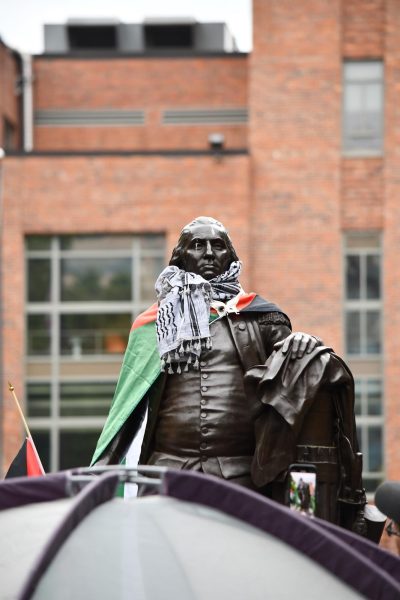This is an ongoing story and will be updated as more information becomes available.
After marching from Georgetown University, pro-Palestine student protesters joined organizers from seven other local universities at a tent encampment in George Washington University’s (GWU) University Yard April 25 to demand a ceasefire in Gaza, call for Washington, D.C.-area colleges to divest from companies linked to the Israel Defense Forces (IDF) and denounce the responses of universities across the country to pro-Palestine protest.
Following a morning walkout and rally, Georgetown protesters marched from the university to D.C.’s Foggy Bottom neighborhood, arriving at GWU shortly after noon; as of 7:30 p.m., additional protesters had joined, with over 500 protesters present at GWU. After reaching University Yard, around half of the marchers — around 60 people — entered the encampment, with others joining external organizers outside the encampment to chant, sing and pray.
The encampment is similar to those that students have established at universities including Columbia University, Barnard College, the University of Texas at Austin and the University of Southern California. Since Columbia students established their encampment, the Gaza Solidarity Encampment, April 17, universities have become centers of pro-Palestine protest, with students calling for an end to Israeli attacks on Gaza, which have killed over 40,000 Palestinians.
The encampment at GWU has been active since 7 a.m., with GWU’s campus police department warning protesters that police would move to clear it by 7 p.m. As of 9:15 p.m., police had not attempted to clear University Yard.
Fida Adely, a Faculty and Staff for Justice in Palestine (FSJP) member and professor of Arab studies at Georgetown, said the march and encampment were powerful demonstrations of solidarity with Palestinians.
“We had faculty and students, I think almost 200 of us walked over here together,” Adely told The Hoya. “It was very powerful, and I think in this moment — where we’re seeing student activism across the country, on a scale that we haven’t seen in decades, maybe, and student activism that has been really strongly repressed in many places — it was good to be able to show our solidarity.”
George Washington University wrote in a 7:50 p.m. statement that the university is currently in conversation with D.C.’s Metropolitan Police Department (MPD) to determine its response to the ongoing encampment.
“As we said earlier, the encampment is an unauthorized use of university space and violates several university policies,” the statement reads. “The university and MPD are continuing to work in coordination to determine how to best address the situation and ensure student compliance with those policies.”

Since October, the Georgetown chapters of Students for Justice in Palestine (SJP), FSJP and Zeytoun, a Georgetown graduate student, faculty and staff organization that advocates for decolonization in Southwest Asia and North Africa, have hosted protests, die-ins and teach-ins, with the April 25 protests marking the largest yet.
Yasin Shami, an external organizer who attended the protest, said the protesters plan to remain in the encampment regardless of any police response.
“The encampment has no plans of leaving until their demands are met,” Shami told The Hoya. “The administration has been obviously threatening with police. We’ll see how that plays out. But I plan to stay as long as, we all want to stay as long as we possibly can.”
While chanting, protesters denounced the IDF, which they referred to as the Israel Occupation Forces, or IOF, and called for intifada, a term that refers to periods of intense uprisings in Palestine against Israel.
“They’ll be in the hall of shame. We’ll be in the Hall of Fame,” protesters chanted at the encampment. “Whose campus? Our campus! Long live the intifada, intifada revolution. There is only one solution, intifada revolution.”
Cale Josephs (SFS ’24) said he attended the protest to push Georgetown and other university administrators to better respond to the conflict in Gaza.
“I would like to see them unequivocally denounce the censure of freedom of speech protests, just assembly happening elsewhere across campuses across this country,” Josephs told The Hoya. “I would also like to see the deplatforming of IOF individuals who have committed atrocities in the Gaza Strip and elsewhere and a complete divestiture from projects and organizations that work with the Israeli Zionist government.”
Counter-protesters arrived at University Yard at around 1:30 p.m., carrying two Israeli flags.
Skyler Sieradzky, a senior at GWU and one of the counter-protesters, said she wanted to demonstrate her solidarity with Israel.
“I think that it was important for me to be here today to show solidarity with my friends and family in Israel and with my people,” Sieradzky told The Hoya. “I think that it’s important also to show that we won’t be intimidated and signs like calling for the extermination of my friends, my family and me, such as ‘From the river to the sea,’ won’t intimidate us, and we will persevere as a people.”
“Not all of us are Jewish, but the Zionist community on GW’s campus is still very much alive,” Sieradzky added.
During the evening, the protests swelled.
“Smash Zionism,” protesters chanted. “We want to wipe it off the face of the planet. We want to end the Zionist occupation of Palestine. Today and forever, we want to end settler colonialism everywhere.”
Akanksha Sinha (SFS ’23), a staff member at Georgetown and organizer with Georgetown’s chapters of FSJP and Zeytoun, lauded the protesters for their solidarity.
“Seeing all members of our community — various ages, various backgrounds — showing up in very active ways to ensure that we are doing everything to protect each other, that has been really moving, and the students, I mean, kudos to them,” Sinha told The Hoya. “I’ve just never seen this level of incredible organization before in my lifetime.”
Sinha said she and other FSJP protesters joined to ensure student safety.
“We’ve seen what’s happened in Columbia, Barnard, UT Austin, USC, we’ve seen an incredible, incredible amount of cop mobilization, and D.C. is notorious for that,” Sinha said. “We’re here to protect our students.”
Shami said that as an external organizer, he did not plan the protests but participated to demonstrate his support for student protesters.
“The students standing up, it couldn’t be the university that has a long, ugly track record of suppressing them in the ugliest, malicious, most malicious and bad faith ways,” Shami said. “For them to be able, students, to galvanize students from other universities, to come together and unite to do this is remarkable. So I’m here to support whatever I can.”
Adely said the diverse array of students and faculty attending the encampment shows the strength of pro-Palestine protests.
“This is a peaceful movement, and it’s a movement for justice,” Adely said. “And this is precisely what I would expect — is a diverse crowd, people in solidarity with each other, people caring for each other, and people willing to take a stand for justice.”
















